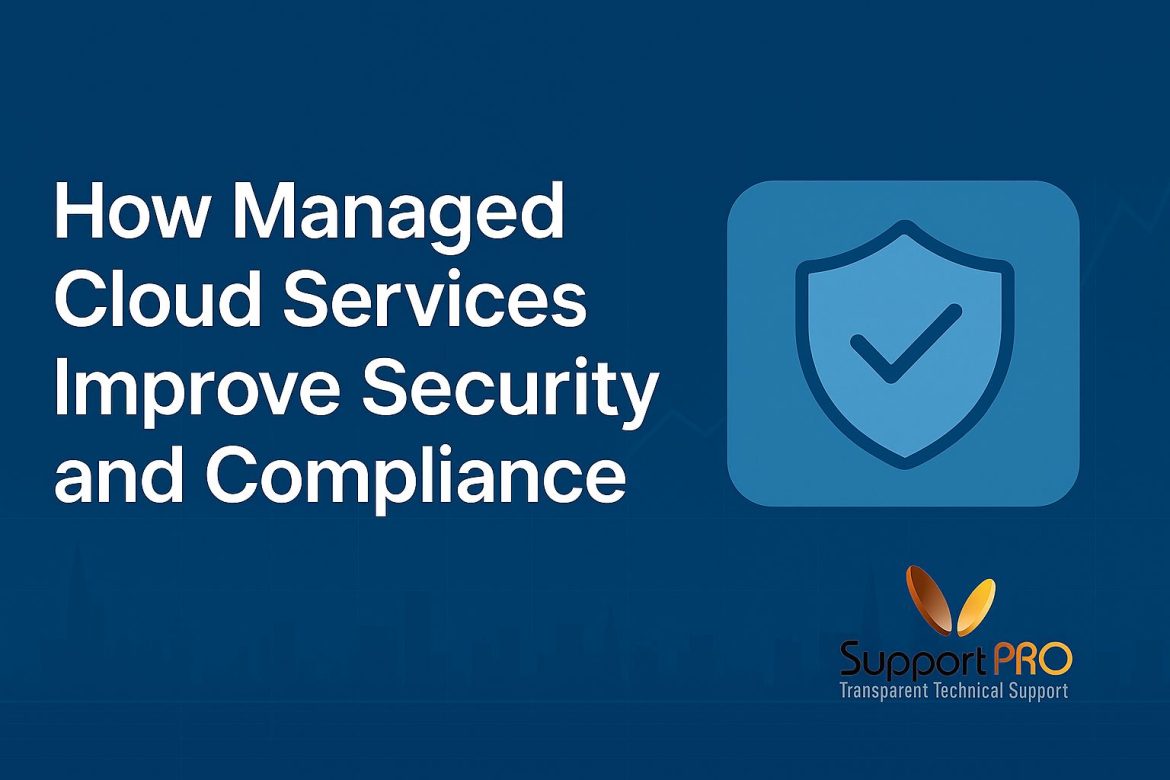With cloud computing taking centre stage for modern digital business operations, a bundle of associated tasks have become a mainstay such as ensuring compliance and security. With cyberthreats evolving everyday, becoming more and more sophisticated the need to proactively stay ahead of potential threats is critical, irrespective of business size. This demands in-depth knowledge of what your business needs and the relevant upgrades and modifications. While in-house teams can help a little, managed cloud services offer an unmatched level of precision and agility. In this article we help you learn how managed cloud services improve security and compliance.
Advantages Offered By Managed Cloud Services
Managed cloud services are offered by dedicated service providers that specialize in cloud solutions, evolving regulatory landscape, and security best practices. Beyond integrating cloud infrastructure, these service providers offer ongoing cloud support for maintaining cloud security and ensuring compliance with evolving regulations. Through constant, transparent solutions and services, they keep the cloud infrastructure protected, incorporating upgrades and features that strengthen the wall and prevent security breaches.
Now let’s dive into the many advantages they offer.
Security-Centric Implementations
The term security encompasses a lot of things and covers a broad set of layers including business data, secure networks, accessibility, and more. Managed cloud services providers excel in this area, staying ahead of all changing security threats, and keeping the business secure by implementing upgraded and relevant security features. These service providers can help integrate 24/7 ecosystem monitoring services and threat identification capabilities. By keeping real-time track of any changes and damage, they also provide quick solutions like on-time updates, patches, etc. Apart from this, they are trained in configuring advanced firewalls and DDoS tools, implemented to protect data.
Data Protection And Recovery Mechanisms
A statista study reveals that one of the biggest security concerns for businesses is the loss of data and its leakage, worrying about 69% of the businesses on the internet. At the same time, roughly 66% of businesses reported experiencing threats regarding data privacy and confidentiality. During migration, and consistently after that, data backup and recovery in case of disasters is essential to be implemented and maintained in cloud computing. Managed cloud service providers ensure your business data is securely backed up on the cloud and stored securely.
They help in implementing data restoring mechanisms which play an integral role in instances of server failure, enabling quick recovery. For businesses handling sensitive data, these service providers offer solutions like immutable backups for protecting confidential data points. Moreover, as businesses expand, so do their security needs, and managed cloud services providers help plan security measures that are scalable with the evolving business needs. They also offer pre-built infrastructures or frameworks for security features which can be deployed quickly to address immediate security concerns.
Implementing Encryption Protocols
Encryption has transformed from a new feature that businesses chose to opt for, into an essential integration for keeping the business operations and data secured. Managed cloud service providers seamlessly integrate end-to-end encryption in the cloud infrastructure, ensuring the pertinent information remains encrypted at all times. They also offer capabilities like central key management, which enable businesses to manage accessibility of the encryption key, thereby simplifying continued monitoring and security effectively. Through these implementations the cloud infrastructure becomes even more strong and impenetrable, ensuring no individual, except those specifically authorized, can access any type of data. While in-house teams have limited skill, robust security and compliance adherence, ensuring all sensitive data is protected and the business is not vulnerable to cyber threats demands expert handling.
Staying Ahead of Compliance
Cloud compliance is non-negotiable. But the tricky part is, compliance norms keep evolving, and as the business changes and grows, the applicable compliance norms pertinent to a business keep evolving. This requires a consistent effort to ensure your cloud system is aligned with regulations like ISO standards, HIPAA, GDPR, etc. The complex nature of compliance norms does not make the job any easier, which makes expert help highly valuable.
Non-compliance can translate into significant challenges for the businesses such as expensive fines, legal issues, and even damage to the reputation, which can lead to poor customer reception. Managed cloud service providers help in building the cloud environment with compliance as a focal point to behind with.
Additionally, they actively try to identify vulnerabilities in the existing system and mitigate risks through optimal strategies. Through security assessment scans, risk analysis, predictive analysis, and more, managed cloud service providers not only ensure your ecosystem remains compliant, but also ready to handle any potential risks.
Worth For Your Investment
An in-house tech team is possible, but that team cannot bring exclusive cloud expertise, and with the many technical elements to handle, cannot provide the level of service a managed cloud service provider can offer. If you go on to hire a full-fledged team for managing the cloud infrastructure, you could end up spending more than hiring third-party vendors. Moreover, you would also need to invest time and resources in finding the right talent, training them, and then striving to retain them.
By comparison, external cloud management service providers bring an unmatched level of expertise in the domain, and since their job focuses solely on cloud ecosystems, they offer continued excellence, ensuring your system is always aligned with any reforms or changes. With these vendors, you do not need to spend time in training. In terms of expenses, what you spend is what you get. Generally service providers offer various levels of services starting from the basic to growing and scaling as per the business’ specific needs.
Conclusion
Cloud has become an essential business tool which allows for seamless functions, data storage, and streamlined workflows. However, with the amount of data it contains, having specialized managing services for the cloud is now equally critical, especially from the point of view of security and compliance. To ensure the system remains aligned with the evolving security and compliance landscape, expert intervention to assess status, inspect the existing infrastructure, and effect changes for improvement is vital for businesses that want to thrive.


